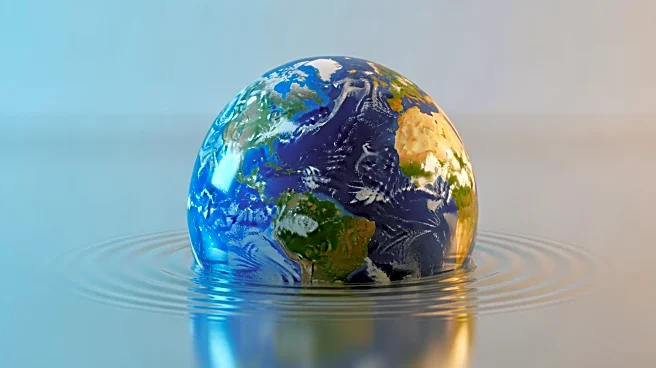What's Happening?
A recent study published in Geophysical Research Letters has found that the pumping of groundwater has caused the Earth to tilt by approximately 31.5 inches. This phenomenon is attributed to the redistribution
of 2,150 gigatons of groundwater, primarily used for irrigation and human consumption, which eventually relocates to the oceans. The study, which analyzed data from 1993 to 2010, highlights the significant impact of groundwater movement on Earth's rotational pole and sea level rise. Researchers modeled changes in Earth's rotational pole and found that the only scenario matching the observed drift included the massive redistribution of groundwater. This discovery underscores the influence of human activity on climate-related changes, particularly in regions like western North America and northwestern India.
Why It's Important?
The findings of this study have profound implications for understanding climate change and its effects on sea level rise. Groundwater pumping, a common practice for agricultural and human use, is now shown to contribute significantly to the drift of Earth's rotational pole and subsequent sea level rise. This revelation adds a new dimension to the challenges faced by conservationists and policymakers in addressing climate change. The study provides a clearer picture of how human activities can alter natural processes, emphasizing the need for sustainable water management practices. As the redistribution of water impacts global mass distribution, it could lead to more pronounced climate-related issues, affecting ecosystems and human settlements worldwide.
What's Next?
The study's findings may prompt further research into historical data to better understand trends in groundwater movement and its long-term effects on Earth's rotation and climate. Conservationists and policymakers might use this information to develop strategies aimed at mitigating sea level rise and other climate-related challenges. Efforts to implement sustainable water management practices could become a priority to prevent further alterations to Earth's natural processes. Additionally, the study could lead to increased awareness and action regarding the environmental impact of groundwater pumping, potentially influencing future regulations and conservation efforts.
Beyond the Headlines
The study highlights the ethical and environmental responsibilities associated with groundwater usage. As human activities continue to impact Earth's natural systems, there is a growing need to balance resource consumption with environmental preservation. The findings may encourage a reevaluation of water management policies and practices, considering their broader implications on global climate and ecosystems. This research also underscores the interconnectedness of human actions and natural phenomena, prompting a deeper exploration of how technological advancements and policy changes can address these challenges.










